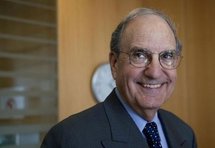
US envoy George Mitchell smiles before his meeting with Israeli Defence Minister Ehud Barak in Tel Aviv, Israel.
Public radio and the Internet news site Ynet said their talks lasted for several hours, but Netanyahu's office would reveal nothing about the content, saying only that it was "a working meeting."
The US envoy is due to pursue his shuttle diplomacy on Friday when he meets Palestinian president Mahmud Abbas in the occupied West Bank city of Ramallah.
With Barak he discussed "ways to start the proximity talks and to use them as a step towards direct talks between the Israel and the Palestinians," the defence minister's office said.
While it appears likely the indirect talks, called off at the last minute in March, will now start within days, there was little if any expectation they would produce tangible results other than a possible resumption of direct negotiations.
Direct talks resumed after a seven-year hiatus in November 2007 but had made little visible progress when they collapsed again just over a year later.
The Palestine Liberation Organisation is due to decide on Saturday whether to proceed with the indirect talks, after which Mitchell will hold a final meeting with Abbas, a senior Palestinian official said.
At that meeting, Abbas will convey to the US envoy the Palestinians' definitive answer on the talks, spokesman Nabil Abu Rudeina said.
Mitchell is then expected to make a formal announcement about the start of the proximity talks on Saturday evening or on Sunday before he returns to Washington, the spokesman said.
Mitchell was also due to meet Israeli President Shimon Peres, Foreign Minister Avigdor Lieberman and opposition leader Tzipi Livni on Friday before heading to Ramallah for the evening talks with Abbas.
The Palestinians had agreed in March to take part in proximity talks but pulled out after Israel announced plans to build 1,600 homes in annexed Arab east Jerusalem.
After receiving US assurances the Jerusalem settlement expansion plan would be shelved, the Palestinians eventually agreed to consider a new attempt at proximity talks.
They want east Jerusalem as the capital of their promised state but Israel considers all of the Holy City to be its "eternal and indivisible" capital.
----------------------------------------------------------------------------
The US envoy is due to pursue his shuttle diplomacy on Friday when he meets Palestinian president Mahmud Abbas in the occupied West Bank city of Ramallah.
With Barak he discussed "ways to start the proximity talks and to use them as a step towards direct talks between the Israel and the Palestinians," the defence minister's office said.
While it appears likely the indirect talks, called off at the last minute in March, will now start within days, there was little if any expectation they would produce tangible results other than a possible resumption of direct negotiations.
Direct talks resumed after a seven-year hiatus in November 2007 but had made little visible progress when they collapsed again just over a year later.
The Palestine Liberation Organisation is due to decide on Saturday whether to proceed with the indirect talks, after which Mitchell will hold a final meeting with Abbas, a senior Palestinian official said.
At that meeting, Abbas will convey to the US envoy the Palestinians' definitive answer on the talks, spokesman Nabil Abu Rudeina said.
Mitchell is then expected to make a formal announcement about the start of the proximity talks on Saturday evening or on Sunday before he returns to Washington, the spokesman said.
Mitchell was also due to meet Israeli President Shimon Peres, Foreign Minister Avigdor Lieberman and opposition leader Tzipi Livni on Friday before heading to Ramallah for the evening talks with Abbas.
The Palestinians had agreed in March to take part in proximity talks but pulled out after Israel announced plans to build 1,600 homes in annexed Arab east Jerusalem.
After receiving US assurances the Jerusalem settlement expansion plan would be shelved, the Palestinians eventually agreed to consider a new attempt at proximity talks.
They want east Jerusalem as the capital of their promised state but Israel considers all of the Holy City to be its "eternal and indivisible" capital.
----------------------------------------------------------------------------









 Home
Home Politics
Politics









